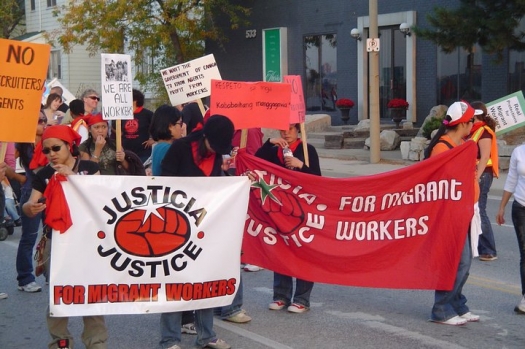Citizenship and Immigration Canada (CIC) is currently consulting the public on Canada’s future immigration plan. Very few Canadians know about this, and even fewer may participate. Given the consultation design and the questions posed by CIC, perhaps that should not be a surprise.
Some call it cliché while others call it irrefutable fact: our country has been and will continue to be built by immigrants. From economic prosperity to social harmony, the well-being of Canada and its people are intrinsically linked to both our immigration policy and the way immigrants are treated in this country.
Yet immigration is forever a subject of polarized debate. On the one hand, with the aging population and ever declining birth rate, many Canadians — economists and demographers among them — are calling for a significant increase in immigration intakes. On the other side of the debate are those — including some newcomers — arguing for a decline or even a complete halt of immigration in light of current unemployment rates and the persistent underutilization of immigrants’ talents and skills.
Where we stand on immigration is a reflection of who we are as a nation.
For decades, our immigration policy included family reunification as one of the core principles which recognized that united families lead to successful community integration and economic strength.
As a signatory to the 1951 UN Convention and Protocol Relating to the Status of Refugees, Canada has also opened its doors to countless refugees fleeing persecution from around the globe. However, Canada’s history is also replete with deliberate and racist measures to exclude those whom Canadians deemed undesirable.
For a national consultation on immigration planning to be meaningful, Canadians need to know all the relevant facts and consider the multi-purpose roles of immigration policy — a notion captured by the concept of nation-building. Immigration planning must not simply be understood as an economic imperative.
But that is precisely what the government wants us to do in this consultation.
CIC background material and its online survey demonstrate a clear bias toward economic-class immigrants, touting their virtues and promoting their numbers at the expense of family-class immigrants and refugees. The consultation questions are designed to illicit favourable responses regarding economic immigrants, while downplaying the importance of the other two categories of immigrants.
For instance, when describing factors to consider in immigration planning, the backgrounder equates integration of immigrants with “economic success,” contrasting them with “refugees and other immigrants with poor health” who rely on government support to integrate.
Already family-class immigrants have significantly shrunk as a percentage of immigrants to Canada, down to 27 per cent. Is it really necessary for CIC to dump on this class of people further?
The backgrounder makes it abundantly clear that the government’s priority is to use immigration to support Canada’s economy. While there is nothing wrong with this objective, it is the short-sightedness and bias with which the government is approaching this goal that needs to be challenged.
Equally alarming have been many changes to a number of specific economic pathways that have given unprecedented influence to employers to determine which newcomers will ultimately be granted permanent residency status. For example, the Canadian Experience Class, the Live-in-Caregiver Program and the Foreign Skilled Worker Program all grant employers a significant role in what really is the job of the nation — determining who can acquire citizenship.
For Canada as a country to succeed, we need immigrants of all backgrounds and skills to come here to build a permanent home. For immigrants to succeed, they need to have a sense of belonging that only comes about when their entire families are integrated into Canadian society.
And contrary to what the consultation paper may suggest, our government has an important role to play in helping immigrants successfully integrate. Policies and programs that deal with systemic discrimination faced by racialized immigrants in the labour market, and adequate funding for immigration settlement programs are measures that should be part and parcel of any rational immigration plan.
Finally, any discussion around our future immigration plan is incomplete if it does not also include a soul-searching exercise of who we are as a people, and the values we choose to embrace. If all that Canada is about is protecting our current economic interests, and the only use of immigrants is to further that goal, then we should just make that clear — both to ourselves and to the people we are inviting to join us. But surely, there is more to Canada than our GDP index or the size of our treasury.
The CIC consultation will come to an end on Aug. 31. Participate. Tell the new immigration minister we need a more balanced mix of immigration, and demand a fuller debate about Canada’s immigration plan.
This article was originally published in the Toronto Star and is reprinted here with permission.
Debbie Douglas is executive director of the Ontario Council of Agencies Serving Immigrants. Avvy Yao-Yao Go is director of the Metro Toronto Chinese & Southeast Asian Legal Clinic.



